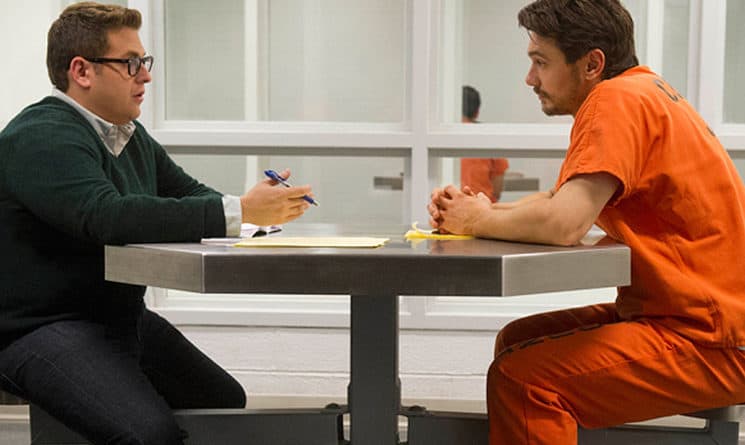In movies, the phrase “based on actual events” is always slippery. There’s a lot of distance between those actual events and the film that ultimately results. Audiences are right to be skeptical — the truth that shows up on screen has likely been filtered and watered down to the point where it bears little resemblance to those initial events.
But what happens when those initial events are already shrouded in ambiguity? That’s the question “True Story,” the new film from director Rupert Goold, explores. It’s an adaptation of journalist Michael Finkel’s memoir of the same title. The story starts in 2001, when Finkel (played here by Jonah Hill) was fired from the New York Times for fabricating parts of a story he wrote on child slavery in Africa. In December of that year, Christian Longo (James Franco) murdered his wife and children in Oregon and went on the run. While a fugitive, Longo used “Michael Finkel” as an alias; that lie became the seed of a relationship between the two men. Finkel sought out Longo, who offered the journalist a deal: if Finkel taught him how to write, he’d give Finkel the truth about his crimes.
It’s a seemingly innocent request, but as Longo, Franco keeps the audience guessing about his true intentions. Franco is no stranger to drama, but at this point, he’s known more for his roles in goofy stoner comedies. In “True Story,” there’s no hint of that comedic actor. In fact, he plays it so straight, so convincingly, that it’s easy to sympathize with his character. Among the film’s strongest moments is a scene in which Longo gives his testimony about the murder of his family. The camera closes in on Franco’s bearded face as he describes each detail of the crime, perhaps manipulating the truth and perhaps not.
Hill, meanwhile, develops Finkel as a kind of mirror image of Longo, a move that adds a level of eeriness to the film. The links between the two characters are cursory — yes, Finkel lied, but his transgression is nothing compared to Longo’s — but enough to open up Finkel to Longo’s influence. At first, Finkel takes Longo as an intricate thinker, and Longo’s seemingly submissive and innocuous mannerisms make Finkel sympathize with the alleged murderer. Finkel becomes obsessive as he receives letters and drawings from Longo in the mail, providing anecdotes and a dark history of Longo’s past — but are they all a series of lies and fabrications?
Hill creates in Finkel an interesting transformation. From self-assured journalist to a man fallen from grace, Finkel earns our sympathy. But that attitude shifts later in the movie; though Finkel is caught up in Longo’s web, the audience can see clearly he’s a victim by choice. Goold shows us flashbacks of Longo’s past, but again, the truth is slippery, and Hill convincingly portrays Finkel’s steady breakdown.
About halfway through the film, Hill’s character is feverishly working on his memoir about his experience with Longo. His wife asks him if he thinks Longo is guilty, to which Finkel admits he has no idea. This reveals the dismal possibility that Finkel has invested himself in something that was never worth a second look — did he waste his chance at redemption by letting himself be manipulated and giving a murderer a voice?
Unfortunately, “True Story” tries to fudge the truth too much. Goold aims for ambiguity, but there are real, clear answers to the question of Longo’s guilt and Finkel’s redemption. Though Hill and Franco give convincing performances, and though the story is well told, Goold’s attempt at picking apart the nature of truth doesn’t quite succeed. But at least it’s an interesting miss.

